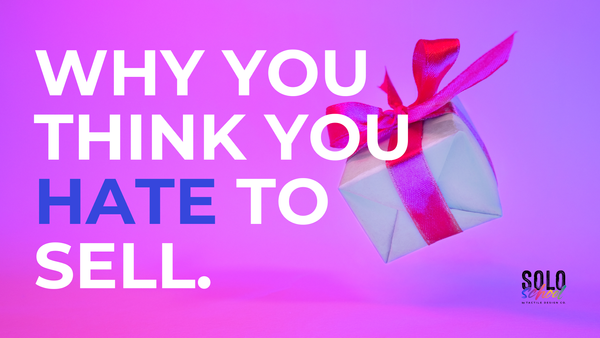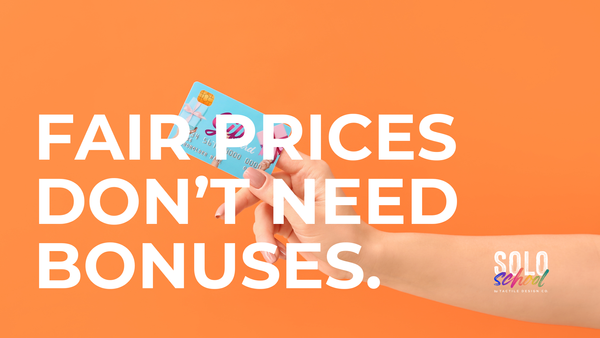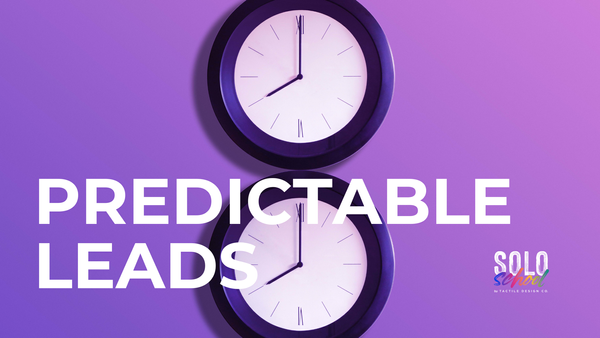“Stop trying to help people during sales calls.”
“Your goal is just to get them to buy”
I’ve heard variations of this advice over the years. For ND people like me, this advice always sounds like “know you can help them, and then don’t - for personal gain.”
Which of course, feels gross…
But the idea behind this, when not taken literally, is actually both sound business advice and more ethical than you think. Let me explain.
Deep down, many people have negative associations with selling.
Not only is it risky (rejection-wise), it’s also something we tend to have had a lot of negative experiences with.
Think about a time when someone sold something to you. You might have a positive experience here and there, but for the most part, those reading this are going to have their negative associations pop up first.
The times you were manipulated, or pressured, or made to feel uncomfortable. The times you were sold something you didn’t need. The times you were sold something you didn’t benefit from.
Now instead, think about a time when you bought something.
Really, just think for a minute about the last time you made a big purchase. Maybe a car or a house. You came prepared and did all your research and knew what you wanted, right? Or maybe you had a feeling that this might be the right move, and when you talked to someone who worked there, you realized that you were right. So you made the purchase.
In both cases, someone sold you something.
Whether you were sold to or you bought something, someone had to ring it through. Someone had to answer your questions. Someone had to be there, facilitating the whole thing, whether it was a pear, a purse, or a high-end support program.
Whether you think of it as being sold something or purchasing something is largely down to your perception of the experience and the autonomy you had in the situation, right?
It comes down to consent and your ability to make an informed decision.
If you felt manipulated or cajoled, if you felt like you couldn’t gather information or ask questions, if you felt disrespected, you were “sold” to.
If you felt in control and feel like you got a good deal on something you wanted, you bought something.
But you’re just using different words to describe different experiences of the same action.
In one instance, a salesperson was manipulative, didn’t gain consent, didn’t give you the information you needed, pressured you, disrespected you, and pushed for the sale.
In the other, the salesperson was responsive, respectful, reciprocal, and provided the information you needed to make a decision without pressure.
This is where ND sales breaks down.
We are told to sell our products and services to people, so we take that literally. We mentally link selling to all of those negative experiences of being sold to.
So it’s easy to assume that to sell things to someone, you are by default going to be giving them a negative experience, and therefore try to overcompensate for that.
We either avoid sales activities all together, or we value-bomb people hoping to show them we’re valuable enough for them to buy without having to “sell” to them.
Now, for some of the people avoiding sales activities, the mindset shift I’m about to share with you is enough to move into action.
For those of you who overdeliver on sales calls? This is the only way through.
Stop trying to solve ten-year problems on sales calls.
I know you’re kind. I know you’re generous. I know you have immense value. I know that you understand deeply what it is like to be in your clients’ shoes. So it’s easy for you, in this position, to want to give them an entire plan to solve all of their problems.
Just tell them what to do over the next 1-2 years, and of course they’ll hire you to help - right?
Unfortunately, it doesn’t work that way.
Imagine you had to fix a big problem in your business. Let’s say (since this is about sales) that you’re just not getting conversions.
You have two options:
- You can jump onto a 60-minute call with an expert in sales. They’ll ask you a handful of questions, and then give you a complete two-year plan to fix all of your sales problems. You’ll have to furiously take notes, but within that hour, you’ll have a step-by-step plan to solve your whole problem. They’ll likely offer to help you implement this whole plan.
60-minute - You can jump onto a 60-minute call with an expert in sales. They’ll spend 20-30 minutes asking you deep, prodding questions to really get to know your business. They’ll dig in all the difficult spots and gather info.
If they can figure out why you’re not getting conversions, they will tell you what they think the problem is - the real root of these issues, at long last! You’ll know exactly what the real problem is, and now you can move forward with focused intention. Once you’ve agreed on the problem, they’ll offer a way to work with them to solve that one very specific problem and get you selling again.
Two important questions to ask yourself here are:
Which call would you take?
and
Which call is more valuable to you?
Exactly.
The person who tried to cram an entire two-year plan into 60 minutes?
Well, they didn’t learn enough about you to even know if it would work, and there were so, so many steps, and now you feel like you know what to do? Mostly? So you don’t need them… But you also probably won’t go back to them if you need help, because you’ll feel ashamed if you can’t just do what they said on your own. Or overwhelmed by what they already gave you.
The call that dug deep into understanding you, the person who worked to figure out exactly what you needed and what was going on, the diagnosis itself - that was the most valuable use of 60 minutes.
When you see advice that says “stop trying to help people on sales calls”, it doesn’t mean “be evil”.
It means you should be trying to solve 10-minute problems on your sales calls, instead of 10-year ones.
It’s more valuable to dig deep and give someone the correct direction, than to skim the surface and give them 1000 steps in the wrong one.
Your role on sales calls, should you choose to accept it, is to be a guide.
To dig deep and get curious and try to uncover the real problem.
To give them a reason - a diagnosis for their challenges or their lack of progress toward their goal.
And, with their consent if the time is right, to provide information about how you can solve that problem. To answer their questions and allow them to make an informed choice.
To let them buy from you.
It feels better for everyone involved when you’re a source of light and truth and value and offer a clear path to getting help, without manipulation and pressure.
- Cheryl
P.S. Want to dive deeper into selling in ethically aligned ways? Solo School is now re-opened for registration! There are resources for one-on-one sales in both Tier One and Tier Two, depending on your current needs.
Interested, but have questions? Hit reply and I’ll respond!
Solo School has now re-opened for registration!
You read that right. The migration of our current resources is complete, so we’re now ready to accept students into our new-and-improved home!
The most important change? New memberships are now lifetime access.
We noticed that many members were joining, and then… Life happened. A lot can happen in a year, right? So we’ve made the switch to lifetime access in three different tiers.
- Newer businesses seeking their first sales can join at the most accessible tier - under $1k for lifetime access!
- More established businesses looking to create repeatable sales can join our mid-level tier for life at lower than our old annual rate.
- And businesses ready to scale can now join a special tier just for them, with high-level additional support.
You can read the details and join here, or reply to this email if you have questions.
Business Adaptation of the Week
My task cards! One of the courses we’re currently building into Solo School is about our project management and task management system, which includes these nifty physical cards you can use as your todo list.
The cards ask you to lay out three important things for each task:
- The point of no return (aka how far you have to get into this task before your brain forces you to finish)
- The resources you need to do the task (so you don’t get stopped half-way through)
- What done looks like (so you can shrink the task and make it less overwhelming.
I’ve been testing these for a few weeks, both physically and digitally, with spectacular results to my productivity. They’ve now moved out to some beta testers in the certification program who are seeing similar results.
This course should be ready in April, so members - watch for it!
My Favourite Things This Week
Tega Organic tea! When I decided to stop drinking Coke Zero due to their affiliations (after a decade of drinking that + coffee for the vast majority of my liquid intake) I had no idea what would come next. I first switched to water, which of course I now love. So that’s great.
But I needed a new source of caffeine, and though I had traditionally thought of tea as “sad brown water”, I was willing to give it another go.
I posted on social a couple of weeks ago looking for recommendations of Canadian teas, and Liz Bandelin from Tega reached out. Because I’ve known her forever and literally forgot. 😂 Anyway, she put together a little care package with some of her best products and I’ve been sampling a new one almost every day. My favourite so far has to be the luxury Peach Apricot Black Tea. The packaging. The flavours. The smell 😍.
Check out their whole selection here. No affiliate link, I’m just a massive fan now that I’ve been able to try so many!
What I’m Reading
I’ve switched my e-reader from Kindle to Kobo (started in Canada, now owned by a Japanese company with a major Canadian presence) and absolutely love it. So I’ve been reading more again! Specifically, I have the Libra Colour. A full-colour e-reader. Be still my heart.
I have two reads currently on the go - one for fun and one for growth.
For fun, I’m reading The Paris Bookseller by Kerri Maher - a sapphic bookstore romance that takes place in post-WWI Paris. I literally don’t have to say anything else to those who get it.
For growth, I just finished The Serviceberry by Robin Wall Kimmerer, and am now moving on to Careless People by Sarah Wynn-Williams. Yes, the one Meta is trying to bury. The expose. The tell-all memoir. Because telling me not to read something is a surefire way to ensure I abof*ckinglutely will.
Want to follow along with my reading?




